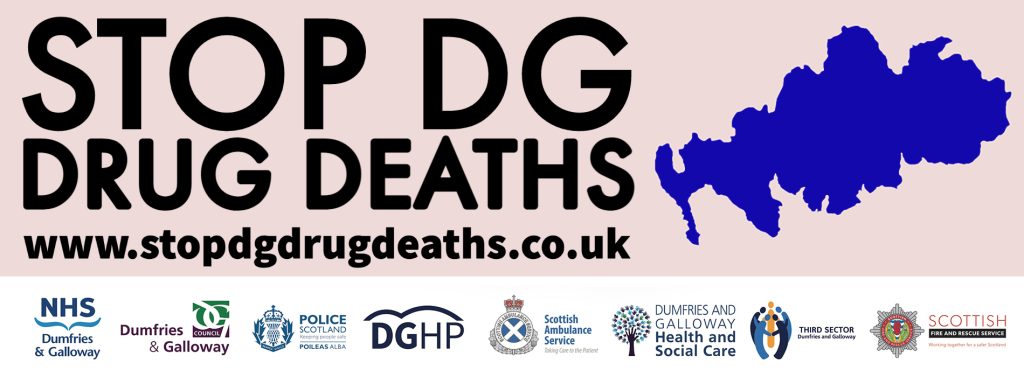
A SIGNIFICANT increase has been recorded in the number of suspected drug-related deaths in Dumfries and Galloway.
Although newly-published numbers for 2020 show a reduction in the number of confirmed drug-related deaths within the region compared to 2019, in the first six months of 2021 there was a total of 25 suspected drug-related deaths.
These are suspected drug-related deaths which have yet to be confirmed. However, they currently represent a 39 per cent increase over the same period last year and comes despite ongoing, concerted efforts to promote measures which can cut drug deaths – including the provision of free Naloxone kits which can help reverse an overdose.
A new website www.stopdgdrugdeaths.co.uk has gone live, initially launching with key information aimed at trying to help drug-related deaths – and continually growing as the campaign expands over coming weeks.
Independent Chair of Dumfries and Galloway Alcohol and Drugs Partnership Grahame Clarke said: “Deaths through drugs are preventable, so any loss of life is a matter of huge regret.
“However, the increase in numbers so far this year compared to 2020 is very marked, and we are asking everyone to help do what they can to help address this deeply concerning situation.”
Mr Clarke points to specific current concerns that people are taking drugs in combination, with evidence of opioids like heroin and methadone being taken along with illicit tablets they believe are benzodiazepines
However, he notes that there is not one single, obvious reason for the increase in suspected drug-related deaths – meaning that a variety of approaches are being applied.
As part of a growing multi-agency campaign which includes the creation of a new dedicated website for the region, drug users are being reminded of the key things they can do to reduce the risk of overdose.
This messaging includes the advice:
- Don’t drugs alone – most suspected fatal overdoses have involved someone taking drugs alone. Taking drugs alone increases the chance of fatally overdosing, because there is no one to call for help in an emergency.
- Don’t take a combination of drugs, drugs that haven’t been prescribed and or drugs that may have been bought over the internet. This includes alcohol and prescribed medication. Mixing drugs greatly increases the risk of overdose, particularly if you don’t know exactly what they are or what effect they will have.
- Don’t try new substances, increase or reduce thequantity of drugs or alcohol being regularly taken without support from your GP or Drug and Alcohol treatment Service. If trying any new substances, try a very small amount at first, so you know how it might affect you.
- Get a Naloxone kit. Naloxone is a medication that temporarily reverses the effects of a heroin or other opioid overdose and allows time for someone to seek emergency help. Friends and family can also get a Naloxone kit
- Dial 999 immediately if you believe that someone is having an overdose or if you feel unwell after taking any drugs. When someone has overdosed, they can look and sound like they are simply asleep; snoring can be an indication the person is having breathing difficulties. Always check when you hear snoring that the person is actually asleep.
Friends and family are also being urged to help by encouraging their loved ones to follow these steps and by encouraging them to seek help either from their GP or from local drug and alcohol treatment services.
Mr Clarke said: “At the moment we are seeing a rise in our suspected drug deaths and are looking at these in more detail. We also know that people are taking different drugs in combination which greatly increased the risk to them. In particular, we are seeing evidence of people taking opioids like heroin and methadone along with illicit tablets they believe are benzodiazepines (often called benzos, valium or vallies) that are bought online or on the streets.”
Mr Clarke said that these combinations of drugs can have a sedating or toxic effect on the body, and he urged drug users not to mix drugs or to take street tablets, no matter how long they had been taking drugs.
“Drug users were also being reminded not to try new substances or to try a very small amount at first to see how it affected them.
Mr Clarke added: “We know the devastating effect that drug deaths have on families and communities.
“Drug deaths are preventable and that’s why we want to make sure that we tell people about the risks to them and how they can get help.
“Every single drug-related death is a cause for major regret, and there is a determination from within the ADP to continue to work across Dumfries and Galloway with partners, people who use drugs and their families to reduce the risk of drug-related deaths as much as we possibly can.”
The message from Dumfries and Galloway Alcohol and Drug Partnership is being echoed and supported by Dumfries and Galloway Local Resilience Partnership in the form of its partners Dumfries and Galloway Health and Social Care Partnership, NHS Dumfries and Galloway, Dumfries and Galloway Council, Police Scotland, Third Sector Dumfries and Galloway, Scottish Fire and Rescue Service, Scottish Ambulance Service and Dumfries and Galloway Housing Partnership.
